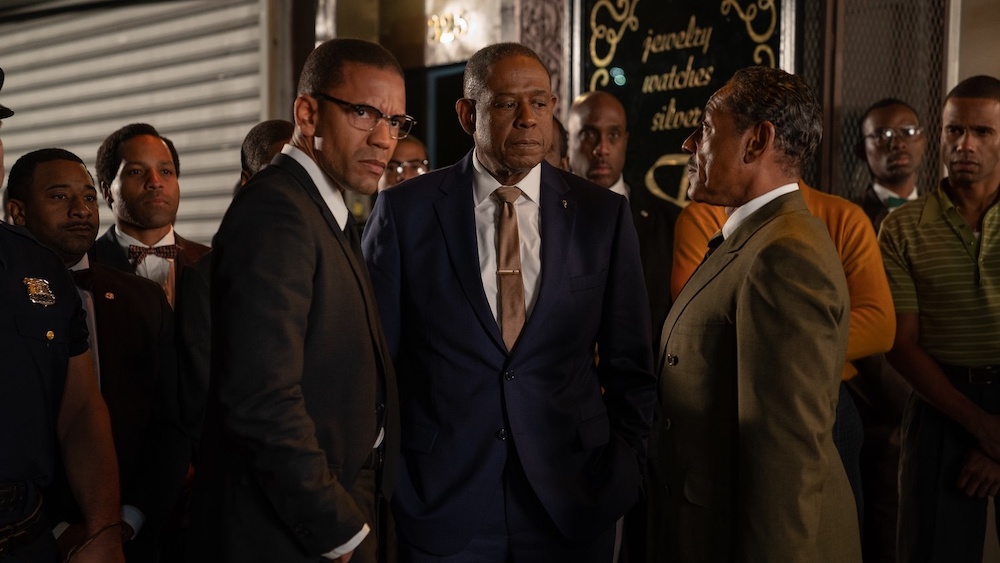If you’re interested in sharing your opinion on any cultural, political or personal topic, create an account here and check out our how-to post to learn more.
____
When Stephanie St. Clair reigned supreme as Queen of Harlem, brownstone and asphalt met with brogues, wingtips, and loafers, tapping to riffs by Gillespie, Lady Day and Fitzgerald.
Then decades later, it was tailored suiting, bow-ties, crisp white shirts, tight-knitted cardigans and shades that donned every bit of Baldwin’s real-life, Beale Streets between 110th and 175th in Upper Manhattan, to a soundtrack of sirens and soul music.
Both times, Ellsworth Raymond “Bumpy” Johnson maintained order as Harlem’s Godfather surrounded by an army of angels including: Malcolm X (whom he knew as Red), Adam Clayton Powell Jr. and his most trusted advisor — his wife, Mame Johnson.
Two to three episodes into Godfather of Harlem, Epix’s haute-couture biopic on Johnson, the network does an amazing job with ambitious big message moments powered by haunting performances from Forest Whitaker, as the Godfather himself, and Nigel Thatch, as the newly minted activist formerly known as Malcolm Little in the nation of Islam and Elijah Muhammad’s number two.
The writers use sub-themes to surround the storylines for each lead that directly (or indirectly) effect Johnson. The biggest has to do with unity — most prevalent during the '60s during the Black Power Movement which would get its footing around the beginning of when the show opens.
Pay close attention.
Godfather of Harlem gives you an abridged class on early '60s-era Black history through rich conversation that’s still very relevant, if not more so, today.
While it hasn’t been written in press or on Epix’s website that the showrunners and writers referenced Mame Johnson and Karen Quinones Miller’s 2008 memoir Harlem Godfather: The Rap on My Husband, Ellsworth Bumpy Johnson, it would only make sense and could explain the portrayal of the other figures in the show.
What’s most relevant about Epix’s Godfather, and Johnson in general, is what he represented — why he was dangerous and why our heroes are different. Powell and Malcolm X, both on opposite sides of the burgeoning Black Power spectrum (up North militant Christian and Nation of Islam), each needed Johnson to unify the people that didn’t trust either of their sidewalk sermons. Granted, their movements and philosophies were much more than the rushed representations from the show, but for the purposes of a 10-episode miniseries, the writers opt to focus on Johnson’s arc and his beef with Italian driver-turned Genovese crime boss Vincente “Chin” Gigante.
When the show opens, Johnson is returning from an 11-year stint on the island and prison of Alcatraz, where he was serving for charges of conspiracy to sell (allegedly), though he maintained (up until his death) he was set up.
Within the first five minutes of the pilot, all of Harlem was present to welcome the Godfather home in a lavish party, but in the midst of handshakes and hugs were asks and weapons. Johnson immediately jumped into his role as protector and enforcer.
This show accomplishes in a longer format, what Hoodlum, also a Bumpy Johnson biopic (starring Laurence Fisburne) doesn’t — it covers the second half of his life. That film, which also stars icon Cicely Tyson as the formidable Stephanie St. Clair, covers his time as her lieutenant and ultimately her successor, and then later, orchestrator of the assassination of mob boss Dutch Schultz.
Johnson was different from those in Harlem who came after him because he was able to unify the people under a fine line that ménage à troised money, power and respect with the same audacity of being young, gifted and Black.
Godfather of Harlem sews together beautifully multiple tiers of truth about Johnson with the same mastery of a seamstress in a Chanel atelier in Paris. He’s a bonafide hero, in the same vein of the Panther’s Newton.
Ownership over our stories is imperative because it empowers us to control our narrative and represent for the people who aren’t here anymore, like Johnson. Whitaker is one of the executive producers of Godfather of Harlem, with music spearheaded by super-producer Swizz Beats.
The stylized Epix offering is another perspective that prior to, had existed only through word of mouth from our elders who remembered how it was when people had respect and knew where they came from when Bumpy was running things.
Mainstream opinion fashioned Bumpy Johnson a criminal. Nothing more, nothing less. Godfather of Harlem is another example of the complicated and beautiful struggle that is being Black in America. That alone makes it worth watching.
The show, also starring Antoinette Crowe-Legacy, Kelvin Harrison Jr. and Ilfenesh Hadera as Mame Johnson, airs on Epix Sundays at 10 p.m. EST.
